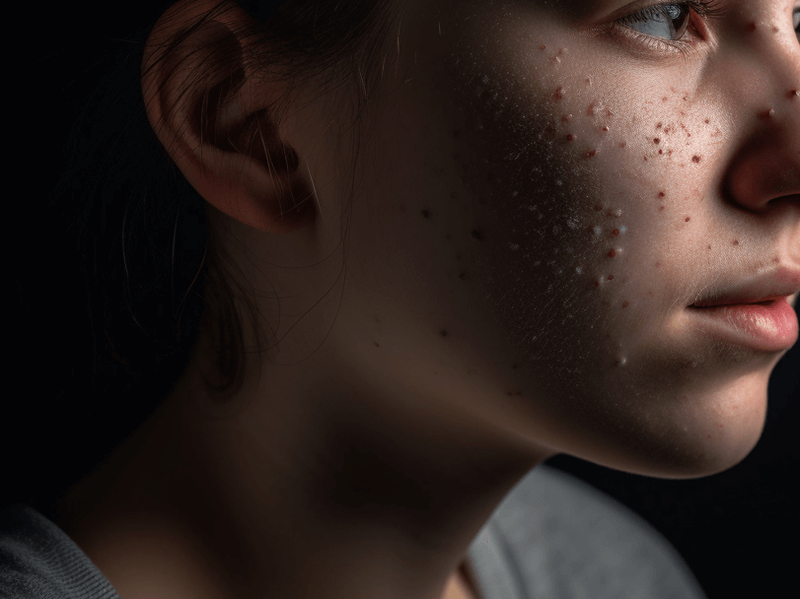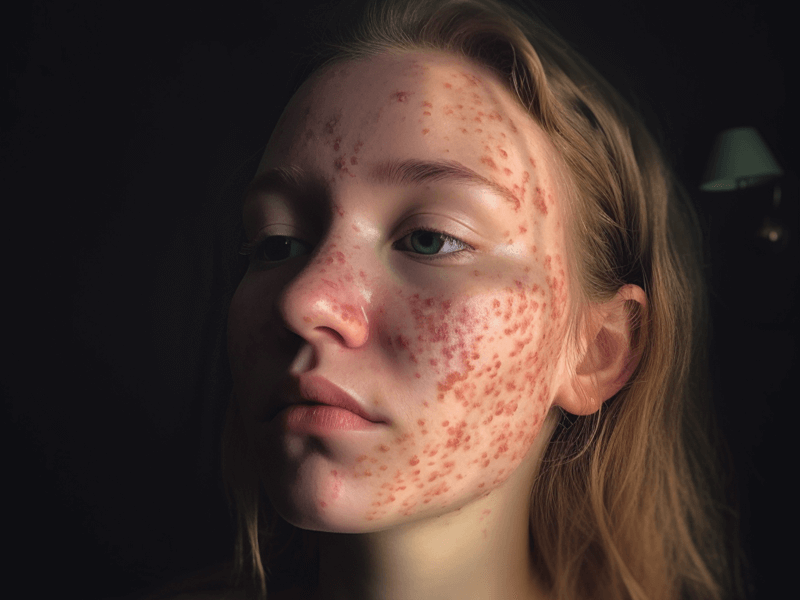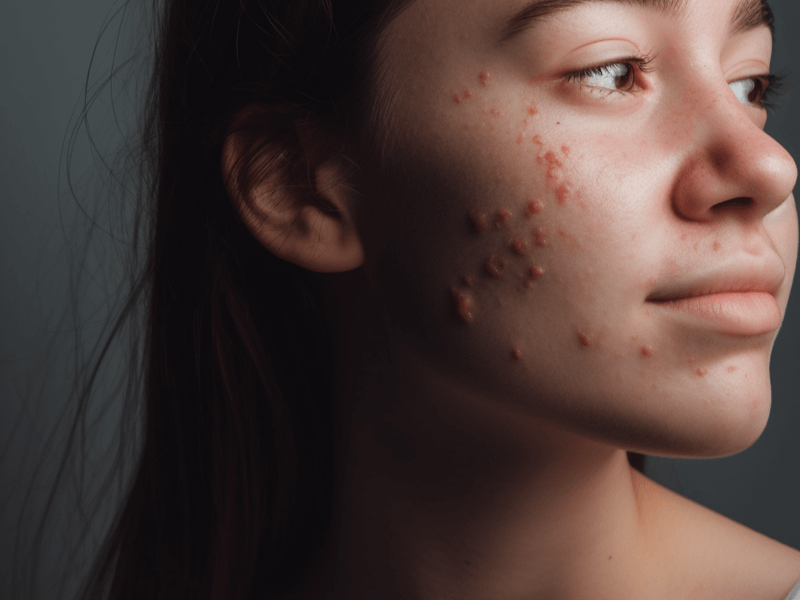Acne, the bane of many teenagers and adults alike, can be a persistent and frustrating skin condition. If you’re tired of those pesky pimples and want to learn how to get rid of acne for good, you’ve come to the right place. In this comprehensive guide, we’ll explore everything you need to know about acne, from its causes and symptoms to effective home remedies and professional treatments. By the end of this article, you’ll have a clear understanding of how to tackle acne and achieve clearer, healthier skin.
Content Index
ToggleWhat is acne?
Acne, scientifically known as acne vulgaris, is a common skin condition that affects people of all ages. It primarily occurs when hair follicles become clogged with oil and dead skin cells, leading to the formation of pimples, blackheads, and whiteheads. Acne can range from mild to severe, and its severity often depends on various factors, including genetics, hormones, and skincare habits.
What causes acne?
Acne is a multifactorial condition with several potential causes. Some of the main culprits include:
- Excess oil production: When your sebaceous glands produce too much oil (sebum), it can mix with dead skin cells and clog pores.
- Bacteria: The presence of Propionibacterium acnes (P. acnes) on the skin can contribute to inflammation and acne breakouts.
- Hormonal changes: Fluctuations in hormone levels, especially during puberty, menstruation, and pregnancy, can trigger acne.
- Genetics: If your parents had acne, you may be more predisposed to developing it.
- Certain medications: Some drugs, such as corticosteroids and lithium, can worsen acne.
- Diet: While the relationship between diet and acne is still under study, some individuals may find that certain foods can exacerbate their acne.
Understanding the root causes of your acne is crucial for determining the most effective treatment approach.
Different types of acne
Acne can manifest in various forms, each with its own characteristics:
- Blackheads: These are small, dark spots that appear when pores are clogged but remain open at the surface.
- Whiteheads: Similar to blackheads, whiteheads occur when pores become clogged, but they remain closed, causing a small bump with a white or flesh-colored top.
- Papules: Papules are small, red, and tender bumps that can be felt under the skin’s surface.
- Pustules: Pustules are similar to papules but contain pus at their centers, giving them a white or yellow appearance.
- Nodules: Nodules are large, painful, solid lumps deep within the skin that can cause scarring.
- Cysts: Cysts are painful, pus-filled lumps beneath the skin’s surface and often lead to severe scarring.
What do acne look like?
Identifying the type of acne you have is essential for effective treatment. Blackheads and whiteheads are often considered non-inflammatory acne, while papules, pustules, nodules, and cysts are inflammatory. Your treatment plan may vary depending on the type and severity of your acne.

How to prevent acne
While you may not be able to completely eliminate the risk of acne, there are several steps you can take to reduce the likelihood of breakouts:
- Maintain a consistent skincare routine: Cleanse your face twice a day to remove excess oil and impurities.
- Use non-comedogenic products: Look for skincare and makeup products labeled as “non-comedogenic” to avoid clogging your pores.
- Avoid excessive scrubbing: Aggressive scrubbing can irritate the skin and exacerbate acne.
- Manage stress: High stress levels can trigger hormonal changes that contribute to acne. Try stress-reduction techniques such as meditation and exercise.
- Watch your diet: While the link between diet and acne is complex, some individuals find that reducing dairy, sugar, and highly processed foods can help.
- Stay hydrated: Drinking enough water can keep your skin hydrated and healthy.
- Avoid picking or squeezing acne: Manipulating your pimples can lead to scarring and worsen inflammation.
When is it time to see a doctor?
If your acne is severe, persistent, or causing emotional distress, it’s time to consult a dermatologist. Dermatologists are medical experts specializing in skin conditions and can provide tailored treatment options for your specific case.
What to expect during a dermatologist visit
During your dermatologist appointment, you can expect the following:
- A thorough examination of your skin to assess the type and severity of your acne.
- Discussion of your medical history, including any medications you’re taking and your skincare routine.
- Personalized treatment recommendations, which may include prescription medications or procedures.
- Guidance on how to care for your skin and prevent future breakouts.
Laser Acne Treatment: A Revolutionary Approach to Clear Skin
Acne, a common skin condition often causing distress and discomfort, can range from mild to severe cases. The causes of acne are multifaceted, involving factors such as hormonal changes, diet, and genetics. Conventional treatment of acne, while effective for some, may not suffice for all. This is where laser acne therapy comes into play, offering a novel solution for those seeking to reduce the appearance of acne and prevent future outbreaks.
Laser treatment for acne works by targeting the key factors involved in acne development. It helps to decrease acne when taken as part of a comprehensive treatment plan, often including prescription acne medications. Suitable for patients with mild or moderate acne, this therapy can also be an adjunct to conventional treatments, enhancing their effectiveness.
Besides treating active acne, laser therapy plays a significant role in treating acne marks, which might also cause emotional distress. By reducing acne lesions and promoting skin healing, this treatment helps in diminishing the long-term impacts of acne.

For those who have tried numerous products or home remedies with little success, laser acne treatment offers a beacon of hope. It is essential for acne patients to consult with a healthcare professional to determine the most suitable treatment regimen. A personalized approach, considering individual acne severity and skin type, is crucial for optimal results.
Incorporating laser therapy into your acne treatment can accelerate the journey towards clearer skin, reducing the duration and intensity of acne sooner. With its ability to address various symptoms of acne, laser treatment of acne stands as a formidable option in the arsenal against this pervasive skin issue. Remember, the first step in any effective acne treatment is to see a doctor to discuss your unique needs and start on the path to healthier, more radiant skin.
How to Get Rid of Acne: Medical Acne Treatment
This section highlights both traditional and innovative approaches, offering insights into how each treatment works to alleviate the symptoms and causes of this widespread skin condition.
Over-the-counter treatments
If your acne is mild, you may start with over-the-counter (OTC) treatments, which can include cleansers, spot treatments, and creams containing ingredients like benzoyl peroxide or salicylic acid. These products can help unclog pores and reduce inflammation.
Prescription medications
For moderate to severe acne, your dermatologist may prescribe medications such as topical retinoids, oral antibiotics, or oral contraceptives (for hormonal acne). Isotretinoin, a powerful medication, may be recommended for severe, persistent acne but requires close monitoring due to potential side effects.
Effective Home Remedies for Acne
In addition to medical treatments of acne , there are several home remedies that may help improve it:
Tea tree oil for acne
Tea tree oil has natural antibacterial properties and can be diluted and applied topically to affected areas. It may help reduce inflammation and kill acne-causing bacteria.

Salicylic acid for clearer skin
Salicylic acid is a common ingredient in OTC acne products. It can help unclog pores and exfoliate the skin, preventing new acne from forming.
Natural remedies to improve acne
Some natural remedies, like aloe vera, honey, and green tea, have anti-inflammatory and antioxidant properties that can be beneficial for acne-prone skin.
Dealing with Acne Scars
How to reduce acne scars
Acne marks can be distressing, but there are treatments available to improve their appearance. Dermatological procedures such as laser therapy, microneedling, chemical peels, and dermal fillers can help reduce the visibility of scars.
Professional treatments for acne scars
Dermatologists can recommend the most suitable treatment for your specific scar type. It’s essential to consult with a professional to determine the best approach for your skin, like Laser Acne Scar Treatment.
Myths and Facts About Acne
Common misconceptions about acne
Acne is a topic surrounded by myths and misinformation. Some of the most prevalent myths include:
- “Acne is caused by dirty skin.”
- “You’ll outgrow acne.”
- “Sun exposure clears acne.”
What the research says
To separate fact from fiction, it’s important to rely on scientific research and expert advice. The American Academy of Dermatology is a reputable source for evidence-based information on acne and other skin conditions.
Topical Products and Acne
Choosing the right acne products
Selecting the appropriate skincare products can make a significant difference in managing acne. Look for products that match your skin type and address your specific concerns, such as oily skin or acne-prone skin.
How to incorporate them into your routine
A consistent skincare routine is essential for acne management. Cleanse, moisturize, and apply treatments as directed by your dermatologist or skincare professional.
Final Thoughts: Clearing Symptoms of Acne for Good
In summary, acne is a common skin condition that can be effectively managed and treated. Understanding the causes, types, and treatment options is the first step toward achieving clearer skin. Whether you opt for OTC products, prescription medications, or home remedies, remember that consistency and patience are key. It’s crucial to consult with a dermatologist for personalized guidance, especially if your acne is severe or persistent.
Key Takeaways
- Acne is a common skin condition caused by factors like excess oil production, bacteria, hormones, genetics, and diet.
- Identifying the type of acne you have is essential for effective treatment.
- Preventing acne involves maintaining a consistent skincare routine, managing stress, and making dietary adjustments.
- Consult a dermatologist if your acne is severe or persistent.
- Treatment options range from OTC products to prescription medications and home remedies.
- Don’t forget to address acne scars with professional treatments.
- Beware of common myths about acne and rely on reputable sources for accurate information.
- Choose the right skincare products and establish a consistent routine for acne management.
By following the advice in this guide, you can take proactive steps to get rid of acne and achieve healthier, more radiant skin. Remember, you’re not alone in your acne journey, and there are effective solutions available to help you regain your confidence and feel great in your skin.


